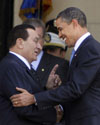
The top agenda items for today’s White House meeting between President Obama and Egyptian President Hosni Mubarak are not a surprise; Middle East peace and combating extremism are the shared preoccupations that define U.S.-Egyptian relations. Yet a less obvious but no less urgent national security concern for Egypt is the situation Sudan. President Mubarak shares President Obama’s stated goal of lasting peace and stability in Sudan, and President Obama must seize this opportunity to leverage the United States’ close relationship with Egypt into a genuine partnership to achieve this mutually desirable outcome.
Egypt’s stakes in Sudan are extraordinarily high for one simple reason: the Nile River. The Blue Nile and White Nile Rivers converge at Sudan’s capital Khartoum and the single waterway continues on toward Egypt and ultimately the Mediterrenean. Any disruptions to the Nile’s flow pose an existential threat to the Egyptians, and Cairo is thus directly implicated in and preoccupied by events not only in Sudan, but in the Nile’s other riparian nations as well.
The constant refrain from Egyptian diplomats working on Sudan is the need for "stability," by which they mean two things: a strong central government in Khartoum with close ties to Cairo and unity between Sudan’s North and South. The widespread belief in Cairo is that if Sudan’s ruling National Congress Party (NCP) were to lose power, the country would descend into "Somalia-like" anarchy. Thus, any challenge to the NCP–such as an armed rebellion or an international arrest warrant–threatens Egypt’s national security.
Similarly threatening to Egypt is the potential break-up of Sudan, which could occur in 2011 when southern Sudan is set to hold a self-determination referendum. Any such alteration to the current Sudanese state would force Cairo to negotiate its rights to the Nile with a new state–one that could potentially seek to use the Nile to unlock its agricultural potential.
While Egypt’s preferences in Sudan are evident, their position is increasingly untenable. The NCP’s strong-arm tactics may seem to serve Egypt’s short-term interests, but the way Sudan has been governed for the past two decades has rendered the country inherently unstable. Moreover, the prospects of a united Sudan diminish with each passing day, as southern secession seems a near certainty at this point.
If Egypt is going to be a constructive partner for the United States on Sudan, President Obama must hammer these points home and get President Mubarak to start thinking seriously about life after the NCP and the critical need for a peaceful and credible self-determination referendum for the South.
The good news is that President Mubarak could be a willing listener. He is a pragmatist and acutely aware of the NCP’s recklessness, having survived an assassination attempt orchestrated by this very regime in 1995. The United States also has some significant leverage with Cairo, which receives some $1.5 billion U.S. in military assistance each year along with significant development funding.
So what can President Obama do to find some common ground with his Egyptian counterpart? We believe that President Obama should seek to secure President Mubarak’s commitment to jointly forge a strong international coalition with a shared strategy for lasting peace in Sudan. The essential elements of such a strategy are the following:
Revitalize the Darfur peace process: The so-called Doha Process is on life support. There is no strategic leadership, and Egypt has actively sought to undermine the process out of sheer pettiness: Egypt sees the host Qatar as an upstart challenger to its traditional diplomatic role in the region. The United States should seek a formal partnership with Egypt–along with France, the United Kingdom, and, potentially, China and Libya–to support AU/UN mediation efforts. Giving Egypt a prominent (and deserved) seat at the table would help end the counterproductive proliferation of alternative processes, and empower mediator Djibril Bassolet to focus on achieving a political settlement.
Implement the North-South Comprehensive Peace Agreement: The North-South peace deal is in serious trouble, and the NCP continues to obstruct implementation and fuel conflict in the south. A poorly managed self-determination referendum for southern Sudan and a return to full-scale civil war would be disastrous for regional stability and likely pull Egypt more directly into a very messy conflict. The United States should enlist Egypt’s support to put greater pressure on the NCP to adhere to its commitments under the CPA. In exchange, the Obama administration should help broker a deal between Egypt and the Government of Southern Sudan on water rights before the referendum and act as a guarantor.
If President Obama can secure President Mubarak’s commitment on these two fronts, the prospects for lasting peace in Sudan will immediately improve.
The article originally appeared on the Huffington Post.
Photo: Egyptian President Hosni Mubarak greets U.S. President Barack Obama in Cairo in June. AP/Amr Nabil

